年秋九年级英语Unit10You’resupposedtoshakehands(第2课时)习题课件(新版)人教新目标版
- 格式:ppt
- 大小:866.00 KB
- 文档页数:15

九年级英语上册Unit10 You’re supposed to shake hands一、课文知识要点:1、You’re supposed to shake hands.你应该握手.①be supposed to do sth.是“应该……",与should用法相似。
否定形式是be not supposed to do sth,意为“不应该……"。
You are supposed to study harder。
你应该更努力学习.You are not supposed to eat so much。
你不应该吃这么多。
Drivers are supposed to wear the seat belt when driving。
司机开车的时候应当系好安全带。
②shake “摇动、抖动”shake → shook → shakenshake hands 握手;shake hands with sb。
/ shake one’s hands 与某人握手At last,he shook his head and refused.最后,他摇摇头拒绝了.2、In the United States,they’re expected to shake hands。
在美国他们要握手.expect “期望;指望;认为;预料”;expect to do sth.期望/期待做某事expect sb to sth. 期待某人做某事be expected to sth 被期待/要求做某事She expects to go abroad。
她期待着出国。
I expected my son to pass the exam.期望我的儿子通过考试。
You can’t expect me to finish the work in just two days.你不能期望我仅在两天之内完成这项工作。
She is expected to be a good doctor。
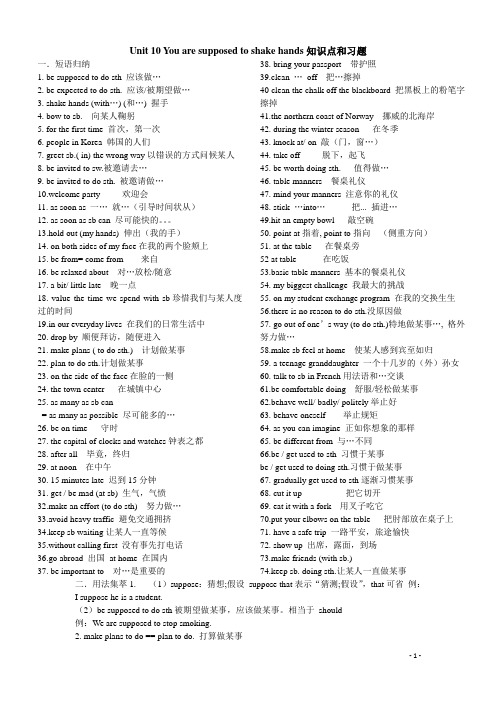
Unit 10 You are supposed to shake hands知识点和习题一.短语归纳1. be supposed to do sth 应该做…2. be expected to do sth. 应该/被期望做…3. shake hands (with…) (和…) 握手4. bow to sb. 向某人鞠躬5. for the first time 首次,第一次6. people in Korea 韩国的人们7. greet sb.( in) the wrong way以错误的方式问候某人8. be invited to sw.被邀请去…9. be invited to do sth. 被邀请做…10.welcome party 欢迎会11. as soon as 一…就…(引导时间状从)12. as soon as sb can 尽可能快的。
13.hold out (my hands) 伸出(我的手)14. on both sides of my face在我的两个脸颊上15. be from= come from 来自16. be relaxed about 对…放松/随意17. a bit/ little late 晚一点18. value the time we spend with sb珍惜我们与某人度过的时间19.in our everyday lives 在我们的日常生活中20. drop by 顺便拜访,随便进入21. make plans ( to do sth.) 计划做某事22. plan to do sth.计划做某事23. on the side of the face在脸的一侧24. the town center 在城镇中心25. as many as sb can= as many as possible 尽可能多的…26. be on time 守时27. the capital of clocks and watches钟表之都28. after all 毕竟,终归29. at noon 在中午30. 15 minutes late 迟到15分钟31. get / be mad (at sb) 生气,气愤32.make an effort (to do sth) 努力做…33.avoid heavy traffic 避免交通拥挤34.keep sb waiting让某人一直等候35.without calling first 没有事先打电话36.go abroad 出国at home 在国内37. be important to 对…是重要的38. bring your passport 带护照39.clean …off 把…擦掉40 clean the chalk off the blackboard 把黑板上的粉笔字擦掉41.the northern coast of Norway 挪威的北海岸42. during the winter season 在冬季43. knock at/ on 敲(门,窗…)44. take off 脱下,起飞45. be worth doing sth. 值得做…46. table manners 餐桌礼仪47. mind your manners 注意你的礼仪48. stick …into…把... 插进…49.hit an empty bowl 敲空碗50. point at指着, point to指向(侧重方向)51. at the table 在餐桌旁52 at table 在吃饭53.basic table manners 基本的餐桌礼仪54. my biggest challenge 我最大的挑战55. on my student exchange program 在我的交换生生56.there is no reason to do sth.没原因做57. go out of one’s way (to do sth.)特地做某事…, 格外努力做…58.make sb feel at home 使某人感到宾至如归59. a teenage granddaughter 一个十几岁的(外)孙女60. talk to sb in French用法语和…交谈61.be comfortable doing 舒服/轻松做某事62.behave well/ badly/ politely举止好63. behave oneself 举止规矩64. as you can imagine 正如你想象的那样65. be different from 与…不同66.be / get used to sth 习惯于某事be / get used to doing sth.习惯于做某事67. gradually get used to sth逐渐习惯某事68. cut it up 把它切开69. eat it with a fork 用叉子吃它70.put your elbows on the table 把肘部放在桌子上71. have a safe trip 一路平安,旅途愉快72. show up 出席,露面,到场73.make friends (with sb.)74.keep sb. doing sth.让某人一直做某事二.用法集萃1. (1)suppose:猜想;假设suppose that表示“猜测;假设”,that可省例:I suppose he is a student.(2)be supposed to do sth被期望做某事,应该做某事。

人教版九年级全一册英语Unit10重点语法知识点总结Unit 10 You're supposed to shake hands.Section A(1a~2d)_必记单词_1. custom n.风俗;习俗【例句】The Japanese customs are different from the Chinese ones.日本的风俗习惯与中国的不同。
2. bow v.& n.鞠躬【例句】The speaker bowed to the listeners. 演讲者向听众鞠躬。
3. kiss v. & n.亲吻;接吻【例句】He gave her a kiss of affection.他给她一个表示爱的吻。
4. greet v.和……打招呼;迎接【例句】We greeted her by saying“Good morning”.我们向她打招呼,说“早上好”。
【联想】greeting n.问候,招呼【搭配】greet with 以……迎接……greet sb. at the airport 在机场迎接某人常考短语ⅡⅡ_1. for the first time 首次;初次2. make friends 交朋友【例句】I find it difficult to make friends with Jim. 我发现和吉姆交朋友很难。
3. as soon as 一……就……4. shake hands (with sb.)(与某人)握手【例句】We usually shake hands with each other.我们通常相互握手。
5. the wrong way 以错误的方式;错误地【例句】You understood him in the wrong way. 你错误地理解他了。
6. hold out 伸出(手等)7. greet each other 互相问候8. to one’s surprise 令某人惊讶的是经典句型ⅢⅡ1. That's how people in Japan are expected to greet each other.那就是在日本人们互相问候的方式。

人教版九年级英语《Unit 10 You’re supposed to shake hands. 》Section A (1a—2d)教学设计一. 教材分析人教版九年级英语《Unit 10 You’re supposed to shake hands. 》Section A(1a—2d)主要讲述了在日常生活中的交际礼仪。
通过本节课的学习,学生能够掌握有关交际礼仪的词汇和表达方式,如“shake hands”,“bow”,“wave”,“clap”,“introduce”,“greet”,“invite”等,并能够运用这些词汇和表达方式进行简单的日常交流。
同时,本节课还介绍了在不同的文化背景下,人们打招呼和交际的方式也不同,如西方人喜欢握手,而东方人则可能更喜欢鞠躬或挥手。
通过对这些内容的学习,学生能够更好地了解和尊重不同文化的交际习惯。
二. 学情分析九年级的学生已经具备了一定的英语基础,能够听懂并运用一些基本的英语句型进行交流。
然而,对于一些关于交际礼仪的专业词汇和表达方式,他们可能还比较陌生。
因此,在教学过程中,教师需要帮助学生掌握这些新词汇和表达方式,并能够灵活运用到日常交流中。
此外,学生可能对不同文化背景下交际方式的了解不多,因此教师在教学过程中还需要注重文化意识的培养。
三. 教学目标1.知识目标:学生能够掌握有关交际礼仪的词汇和表达方式,如“shakehands”,“bow”,“wave”,“clap”,“introduce”,“greet”,“invite”等,并能够运用这些词汇和表达方式进行简单的日常交流。
2.能力目标:学生能够听懂并能够运用本节课所学内容进行日常交流,提高他们的英语口语表达能力。
3.情感目标:通过对比中外交际方式,培养学生的文化意识,使他们能够更好地了解和尊重不同文化的交际习惯。
四. 教学重难点1.重点:学生能够掌握有关交际礼仪的词汇和表达方式,并能够运用这些词汇和表达方式进行简单的日常交流。
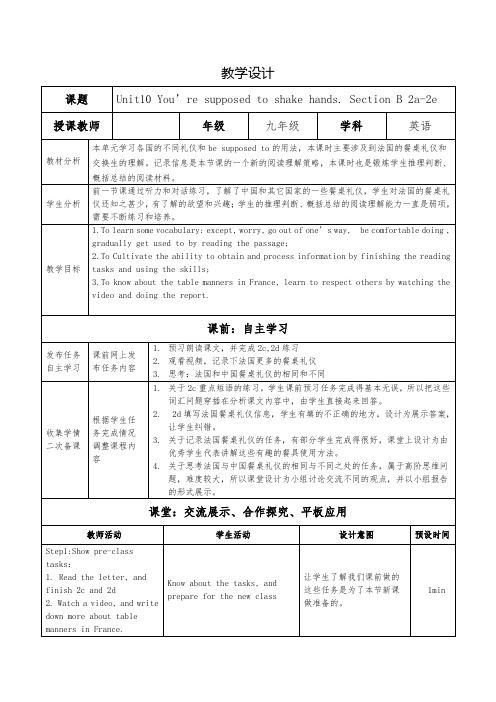

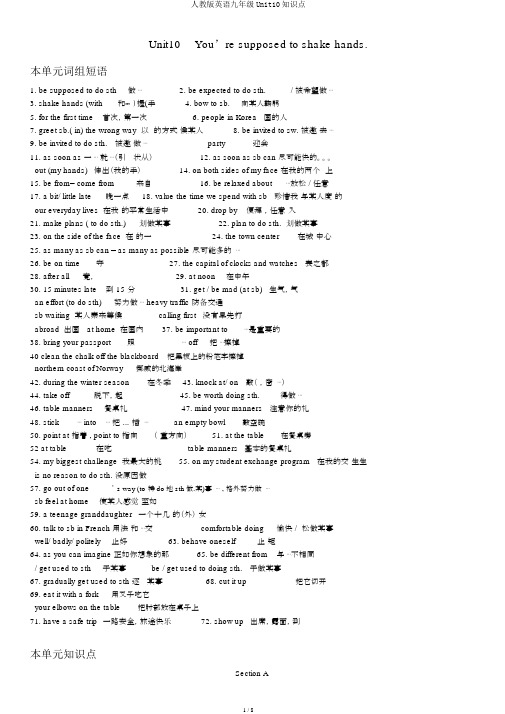
Unit10 You’re supposed to shake hands.本单元词组短语1. be supposed to do sth做⋯2. be expected to do sth./ 被希望做⋯3. shake hands (with和⋯)握(手4. bow to sb.向某人鞠躬5. for the first time首次,第一次6. people in Korea 国的人7. greet sb.( in) the wrong way 以的方式候某人8. be invited to sw. 被邀去⋯9. be invited to do sth.被邀做⋯party迎会11. as soon as 一⋯就⋯(引状从)12. as soon as sb can 尽可能快的。
out (my hands)伸出(我的手)14. on both sides of my face 在我的两个上15. be from= come from来自16. be relaxed about⋯放松/任意17. a bit/ little late晚一点18. value the time we spend with sb珍惜我与某人度的our everyday lives 在我的平常生活中20. drop by便拜,任意入21. make plans ( to do sth.)划做某事22. plan to do sth. 划做某事23. on the side of the face 在的一24. the town center在城中心25. as many as sb can = as many as possible 尽可能多的⋯26. be on time守27. the capital of clocks and watches 表之都28. after all竟,29. at noon在中午30. 15 minutes late到15分31. get / be mad (at sb)生气,气an effort (to do sth)努力做⋯ heavy traffic防备交通sb waiting 某人素来等候calling first没有早先打abroad 出国at home 在国内37. be important to⋯是重要的38. bring your passport照⋯off把⋯擦掉40 clean the chalk off the blackboard把黑板上的粉笔字擦掉northern coast of Norway挪威的北海岸42. during the winter season在冬季43. knock at/ on敲(,窗⋯)44. take off脱下,起45. be worth doing sth.得做⋯46. table manners餐桌礼47. mind your manners注意你的礼48. stick⋯into⋯ 把...插⋯an empty bowl敲空碗50. point at 指着 , point to 指向(重方向)51. at the table在餐桌旁52 at table在吃table manners基本的餐桌礼54. my biggest challenge 我最大的挑55. on my student exchange program在我的交生生is no reason to do sth. 没原因做57. go out of one’ s way (to特do地sth做.某)事⋯ ,格外努力做⋯sb feel at home使某人感觉至如59. a teenage granddaughter一个十几的(外)女60. talk to sb in French 用法和⋯交comfortable doing愉快/松做某事well/ badly/ politely止好63. behave oneself止矩64. as you can imagine 正如你想象的那65. be different from与⋯不相同/ get used to sth于某事be / get used to doing sth. 于做某事67. gradually get used to sth 逐某事68. cut it up把它切开69. eat it with a fork用叉子吃它your elbows on the table把肘部放在桌子上71. have a safe trip一路安全,旅途快乐72. show up出席,露面,到本单元知识点Section A1. In your country, what are you supposed to do when you meet someone for the first time【剖析】 be supposed to do sth被希望做某事,做 ......1)当主是人,表示告、建、任等,=should = “ tobe expected to do sth,You are supposed to___________( arrive) on time2)当主是物,表示“本;本”The train was supposed to arrive half an hour ago.【拓展】: be supposed to与should(1)be supposed 是 suppose 一的 ___________ 构。
![九年级英语Unit10You’resupposedtoshakehands.课文重难点知识点详细讲解[1]解读](https://img.taocdn.com/s1/m/6ec6289ed4d8d15abe234ee6.png)
Unit10 You’re supposed to shake hands.Section A1.In your country, what are you supposed to do when you meet someone for the first time?在你们国家,当你第一次见到某人的时候你应该做什么?【解析】be supposed to do sth 被期望做某事,应该做......1)当主语是人时,表示劝告、建议、责任等,=should =“to be expected to do sth,You are supposed to___________( arrive) on time2)当主语是物时,表示“本应;本该”The train was supposed to arrive half an hour ago.【拓展】:be supposed to 与should(1)be supposed是suppose一词的___________ 语态结构。
后接动词不定式,相当于___________ .后接不定式.即:_______________ . 使用较随便,建议性强否定式为be not supposed to do sth.()To keep safe, drivers aren’t supposed to drink before driving.A. aren’t willing toB. shouldn’tC. aren’t sure toD. don’t have to(2)should后接动词______ ,属于_______ 语态形式,使用起来较严肃和正式;You are not supposed to shake hands. = You shouldn’t shake hands.你不应与之握手。
【2012贵州贵阳】“Henry, you ______ tell the teacher if you want to go out of the classroom.”“Sorry, sir.”A. are supposed toB. are surprised toC. are afraid to【2013山东菏泽】8. You are _____to type quickly when talking to each other on QQ so the other person doesn't get bored A. suggested B. supportedC. taughtD. Supposed【2013黑龙江绥化】29. You are supposed to ________ smoking, ________ you will get ill.A. go on; soB. give up; or C stop; so【2014黔西南州】27. The students ought to wear school uniforms when they’re at school.A. are supposed toB. are allowed toC. would like toD. love to 【2014云南昆明】29. We are supposed to ___________a solution to stop people from looking down at their mobile phones while driving cars.A. come up withB. come formC. come outD. come true 【解析2】for the first time 首先,第一次【辨析】at first/first of all(1) at first = at the beginning 最初,开始【强调在时间顺序或做某事过程等开始之初】(2) first of all 首先,第一【表明陈述事情的重要性】( ) When you want to work for our country in the future, ____, we should have strong body and rich knowledge.A. at firstB. first of allC. for the first timeD. after all【山东德州】We can do a lot to stay healthy. ____ , we should eat a balanced(平衡的) diet.A. At a timeB. In factC. First of allD. All together【有关time的短语】A. firstB. oneC. onceD. firstly【2014贵州六盘水】24. Children always have a good time at the Wetland Park(湿地公园) of Liu Panshui.A. enjoy themselvesB. help each otherC. look beautifulD. have a big dinner()② People in China ________when they meet for the first time.A. bowB. kissC. shake handsD. laugh【新疆】You’re supposed to shake ______ (hand) when you meet your friends.( ) ②—Do you think our football team will win the match? —Yes, we have better players. so I ___them to win.A. hopeB. askC. helpD. expect【2013山东青岛】14. — You look sad. What has happened? —Everyone ______ us to win the match, but we lost.A. expectsB. expectedC. hopesD. Hoped【2013 湖北黄冈】30. Speak slowly, Mr. Wang. I can’t follow you.D. expect希望全班同学参加讨论。

Unit10You'resupposedtoshakehands原文与翻译初中生学习英语要注意多听,将上课本录音下载下来,课前课后要反复练习听力,不能只停留在课上听的那十几分钟上。
下面是小偏整理的Unit10You'resupposedtoshakehands原文与翻译,感谢您的每一次阅读。
Unit10You'resupposedtoshakehands原文与翻译SectionA1bListenandcheckyouranswersin1a.Yoshi:Whatarepeoplesupposedtodowhentheymeetinyourco untry,Rodrigo?Rodrigo:Doyoumeanwhenpeoplemeetforthefirsttime?Yoshi:Yeah.Rodrigo:InMexico,weshakehands.Yoshi:WhataboutinBrazil,Celia?Celia:Well,inBrazil,peoplesometimeskiss.HowaboutinJapan,Y oshi?Whatarepeopleexpectedtodowhentheymeetforthefirsttime?Yoshi:Webow.Kim:AndinKoreawealsobow.Mike:Well,IguessinmostWesterncountriesweshakehands.SectionA2astnightshehaddinneratanAmer icanfriend’shouse.Listenandcheck(√)themistakesMariamade.Daisy:Hi,Maria.HowwasPaul’sparty?Maria:Oh,Daisy,itwasterrible.Daisy:Itwas?Maria:Uh-huh.Daisy:Whathappened?Maria:Well,Iwassupposedtoarriveat7:00,butIarrivedat8:00.Daisy:Oh,soyouwerelate.Maria:Yeah,butinmycountry,it’sdifferent.Whenyou’reinvit edfor7:00,you’reexpectedtocomelater!It’sconsideredstranget oturnupontime.Daisy:Isee.Maria:ThenwhenImetPaul’smom,Ikissedher.Daisy:Oh…youweresupposedtoshakehandsinstead.Maria:That’sright.AndIworeafanc ydress.Daisy:What’swrongwiththat?Maria:Well,itturnedoutthatitwasanoutdoorparty,Daisy.Every oneelsewasinaT-shirtandjeans.Daisy:Iguessnexttimeyoushouldaskwhatyou’resupposedto wear.SectionA2bListenagain.Fillintheblanks.Daisy:Hi,Maria.HowwasPaul’sparty?Maria:Oh,Daisy,itwasterrible.Daisy:Itwas?Maria:Uh-huh.Daisy:Whathappened?Maria:Well,Iwassupposedtoarriveat7:00,butIarrivedat8:00.Daisy:Oh,soyouwerelate.Maria:Yeah,butinmycountry,it’sdifferent.Whenyou’reinvit edfor7:00,you’reexpectedtocomelater!It’sconsi deredstranget oturnupontime.Daisy:Isee.Maria:ThenwhenImetPaul’smom,Ikissedher.Daisy:Oh…youweresupposedtoshakehandsinstead.Maria:That’sright.AndIworeafancydress.Daisy:What’swrongwiththat?Maria:Well,itturnedoutthatitwasanoutdoorparty,Daisy.EveryoneelsewasinaT-shirtandjeans.Daisy:Iguessnexttimeyoushouldaskwhatyou’resupposedto wear.SectionA2dRoleplaytheconversation.Howwasthewelcomepartyforforeignstudentslastnight?Great!Imadesomenewfriends.Butafunnythinghappened.What?ImetaJapaneseboycalledSato,andassoonasIheldoutmyhand, hebowed.That'showpeopleinJapanareexpectedtogreeteachother.It'sim politeifyoudon'tbow.Ididn'tknowthat.SoIjuststoodtherewithmyhandout.Finally,Ire turnedthebow.IrememberwhenlfirstmetMarielastyear,Ididthesamething.Ihe ldoutmyhandandtomysurprise,shekissedmeonbothsidesofmyfac e!Iwouldn'tmindthat!terlfoundoutFrenchpeoplearesupposedtokissw hentheyseeeachother.SectionA3aReadthefollowingopinionsofaColombianandaSwissstudent.I nwhichcountryisitOKtobe15minuteslatefordinner?TeresaLopezCall.ColomblaWhereI’mfrom,we’reprettyrelaxedabouttime.Wedon’tlik etorusharound,sowedon’tmindifpeoplearealittlelatesometimes.Ifyoutellafriendyou’regoingtotheirhousefordinner,it’sOKif youarriveabitlate.Weliketoenjoyourtimeslowly.Wevaluethetimew espendwithourfamilyandfriendsinoureverydaylives.Weoftenjustdropbyourfriendshomesifwehavetime.Wedon’tusuallyhavetomakeplanstomeetourfriends.Whenweseeeachoth er,it’spoliteforboystoshakehandsandforgirlstokisseachotheront hesideoftheface.Weoftenjustwalkaroundthetowncenter,seeingasmanyofourfr iendsaswecan!Marcleblanclausanne.SwitzerlandInSwitzerland,it’sveryimportanttobeontime.We’rethecapi talofclocksandwatches,afterall!Ifsomeoneinvitesyoutomeethimo rheratnoon,thenyou’reexpectedtobethereatnoon.Ifyou’reeven15minuteslate,y ourfriendmaygetmad.SoImake anefforttobeontimewhenImeetmyfriends.Ialwaysleavethehousee arlytoavoidheavytrafficbecauseIthinkit’simpolitetokeepothersw aiting.Also,wenevervisitafriend’shousewithoutcallingfirst.Wealmo stalwaysmakeplanstoseefriends.Weusuallyplantodosomethingin teresting,orgosomewheretogether.SectionB1bSteveisgoingtoChinatostudy.HisfriendYangMingistellinghim aboutthetablemannersinChina.Listenandnumberthepicturesinth eorderyouhearthem.YangMing:YoumustbeexcitedaboutleavingforChinatomorro w,Steve!Steve:Yeah,butI’malittlenervous,too.YangMing:Why?Steve:Well,foronething,Idon’tknowhowtousechopsticksver ywell…andIdon’tknowhowtobehaveatthedinnertable.YangMing:Oh,Isee.Well,oneimportantthingisthatyou’renots upposedtostarteatingfirstifthereareolderpeopleatthetable.Steve:That’sinteresting.IntheUnitedStates,itdoesn’tmatter.YangMing:Yeah,Iknow.It’salsoimpolitetostickyourchopsticksintoyourfood.Youshouldn’tpointatanyonewithyourchopsticks, either.Steve:Oh,OK.YangMing:Oh,andthere’sonemorethingyouneedtoknow.Yo u’renotsupposedtotalkwhenyou’reeatingdinner.Onlyparentsa reexpectedtotalkatthedinnertable.Childrenarenotallowedtospea k.Steve:Wow!That’s…that’sunusual!YangMing:Haha,I’mjustkidding!SectionB1cListenagain.Matchthesesentenceparts.YangMing:YoumustbeexcitedaboutleavingforChinatomorro w,Steve!Steve:Yeah,butI’malittlenervous,too.YangMing:Why?Steve:Well,foronething,Idon’tknowhowtousechopsticksver ywell…andIdon’tknowhowtobehaveatthedinnertable.YangMing:Oh,Isee.Well,oneimportantthingisthatyou’renots upposedtostarteatingfirstifthereareolderpeopleatthetable.Steve:That’sinteresting.IntheUnitedStates,itdoesn’tmatter.YangMing:Yeah,Iknow.It’salsoimpolitetostickyourchopstick sintoyourfood.Youshouldn’tpo intatanyonewithyourchopsticks, either.Steve:Oh,OK.YangMing:Oh,andthere’sonemorethingyouneedtoknow.Yo u’renotsupposedtotalkwhenyou’reeatingdinner.Onlyparentsa reexpectedtotalkatthedinnertable.Childrenarenotallowedtospea k.Steve:Wow!That’s…that’sunusual!Yang Ming:Haha,I’mjustkidding!Readtheletterandanswerthequestions.DearLaura,Thanksforyourmessage.Yes,I’mhavingagreattimeonmystudentexchangeprograminFrance.IwasabitnervousbeforeIar rivedhere,buttherewasnoreasontobe.Myhostfamilyisreallynice.Th eygooutoftheirwaytomakemefeelathome.Thegrandmotherknow sthatImissChinesefoodalot.SosheactuallylearnedhowtomakeChi nesefood!Shealsohasateenagegranddaughteraboutmyagewhois reallykind.ShealwaystalkstomeinFrenchtohelpmepractice.Youwo uldn’tbelievehowquicklymyFrenchhasimprovedbecauseofthat.I’mverycomfortablespeakingFrenchnow.AlthoughIstillmak elotsofmistakes,itdoesn’tworrymeasitusedto.Mybiggestchallengeislearninghowtobehaveatthedinnertabl e.Asyoucanimagine,thingsareverydifferentfromthewaytheyareat home.Forexample,you’renotsupposedtoputyourbreadonyourpl ate.You’resupposedtoputitonthetable!Ithoughtthatwasprettyst rangeatfirst,butnowI’musedtoit.Anotherexampl eisthatyou’renotsupposedtoeatanythingwit hyourhandsexceptbread,notevenfruit.Youhavetocutitupandeatit withafolk.Anotherthingisthatitisimpolitetosayyou’refull.Ifyoudo n’twantanymorefood,youshouldjustsay,“Thatwasdelicious.”Al so,you’renotsupposedtoputyourelbowson thetable.Ihavetosayt hatIfinditdifficulttoremembereverything,butI’mgraduallygettingusedtoit.Idon’tfindFrenchcustoms sostrangeanymore,I’llwriteagainsoonandtellyoumoreaboutmylifeinFrance.Hopeyou’rehavingagoodschoolyear.Yours,LinYue翻译:凯蒂:昨晚为留学生举办的欢迎派对怎么样?约翰:真棒!我交了一些新朋友,不过发生了一件很有趣的事情。
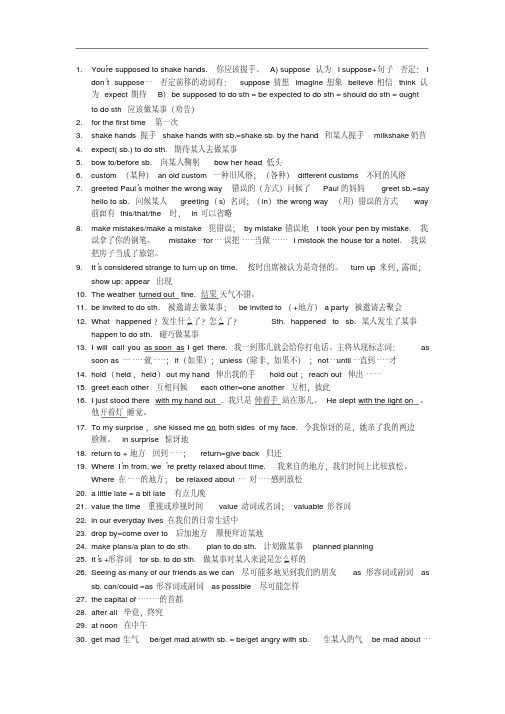
1.You’re supposed to shake hands. 你应该握手。
A) suppose 认为I suppose+句子否定:Idon’t suppose…否定前移的动词有:suppose猜想imagine想象believe相信think认为expect期待B)be supposed to do sth = be expected to do sth = should do sth = ought to do sth 应该做某事(劝告)2.for the first time 第一次3.shake hands 握手shake hands with sb.=shake sb. by the hand 和某人握手milkshake奶昔4.expect( sb.) to do sth. 期待某人去做某事5.bow to/before sb. 向某人鞠躬bow her head低头6.custom (某种)an old custom 一种旧风俗;(各种)different customs 不同的风俗7.greeted Paul’s mother the wrong way 错误的(方式)问候了Paul的妈妈greet sb.=sayhello to sb. 问候某人greeting(s)名词;(in)the wrong way (用)错误的方式way 前面有this/that/the时,in可以省略8.make mistakes/make a mistake 犯错误;by mistake错误地I took your pen by mistake. 我误拿了你的钢笔。
mistake…for…误把……当做……I mistook the house for a hotel. 我误把房子当成了旅馆。
9.It’s considered strange to turn up on time. 按时出席被认为是奇怪的。

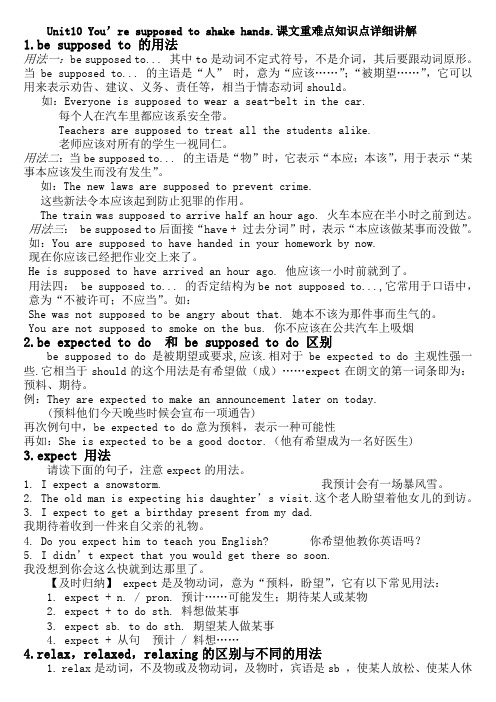
Unit10 You’re supposed to shake hands.课文重难点知识点详细讲解1.be supposed to 的用法用法一:be supposed to... 其中to是动词不定式符号,不是介词,其后要跟动词原形。
当be supposed to... 的主语是“人”时,意为“应该……”;“被期望……”,它可以用来表示劝告、建议、义务、责任等,相当于情态动词should。
如:Everyone is supposed to wear a seat-belt in the car.每个人在汽车里都应该系安全带。
Teachers are supposed to treat all the students alike.老师应该对所有的学生一视同仁。
用法二:当be supposed to... 的主语是“物”时,它表示“本应;本该”,用于表示“某事本应该发生而没有发生”。
如:The new laws are supposed to prevent crime.这些新法令本应该起到防止犯罪的作用。
The train was supposed to arrive half an hour ago. 火车本应在半小时之前到达。
用法三: be supposed to后面接“have + 过去分词”时,表示“本应该做某事而没做”。
如:You are supposed to have handed in your homework by now.现在你应该已经把作业交上来了。
He is supposed to have arrived an hour ago. 他应该一小时前就到了。
用法四: be supposed to... 的否定结构为be not supposed to...,它常用于口语中,意为“不被许可;不应当”。
如:She was not supposed to be angry about that. 她本不该为那件事而生气的。
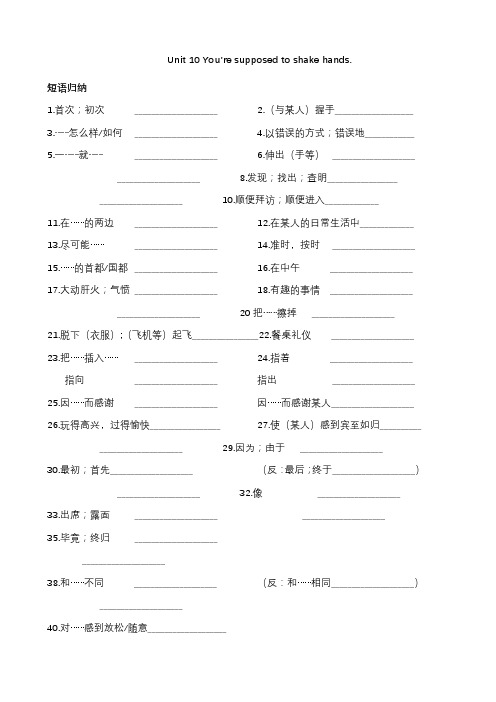
Unit 10 You're supposed to shake hands.短语归纳1.首次;初次____________________2.(与某人)握手___________________3.……怎么样/如何____________________4.以错误的方式;错误地____________5.一……就……____________________6.伸出(手等)________________________________________ 8.发现;找出;查明_________________ ____________________ 10.顺便拜访;顺便进入_____________11.在……的两边____________________ 12.在某人的日常生活中_____________ 13.尽可能……____________________ 14.准时,按时____________________ 15.……的首都/国都____________________ 16.在中午____________________ 17.大动肝火;气愤____________________ 18.有趣的事情________________________________________ 20把……擦掉____________________21.脱下(衣服);(飞机等)起飞________________22.餐桌礼仪____________________ 23.把……插入……____________________ 24.指着____________________指向____________________ 指出____________________25.因……而感谢____________________ 因……而感谢某人____________________26.玩得高兴,过得愉快_________________ 27.使(某人)感到宾至如归______________________________ 29.因为;由于____________________30.最初;首先____________________ (反:最后;终于____________________)____________________ 32.像____________________ 33.出席;露面____________________ ____________________35.毕竟;终归________________________________________38.和……不同____________________ (反:和……相同____________________)____________________40.对……感到放松/随意___________________Section A风俗习惯1)custom〔名词〕风俗;习俗The customs are different from country to country.I don't like the custom of giving presents in that country.The Japanese customs are different from the Chinese ones.Nailbiting is one of her bad habits.2.bow 鞠躬bow①〔不及物动词〕鞠躬bow to/before...向……鞠躬The speaker bowed to/before the listeners.②〔及物动词〕低(头)She bowed her head.③〔名词〕鞠躬(读作/bau/);弓(读作/bəu/)The Japanese usually take a bow while greeting.He made his son a bow.3.shake hands 握手shake hands 握手其中shake(shook,shaken) 既可用作及物动词,也可用作不及物动词,意为“摇动;抖动”。